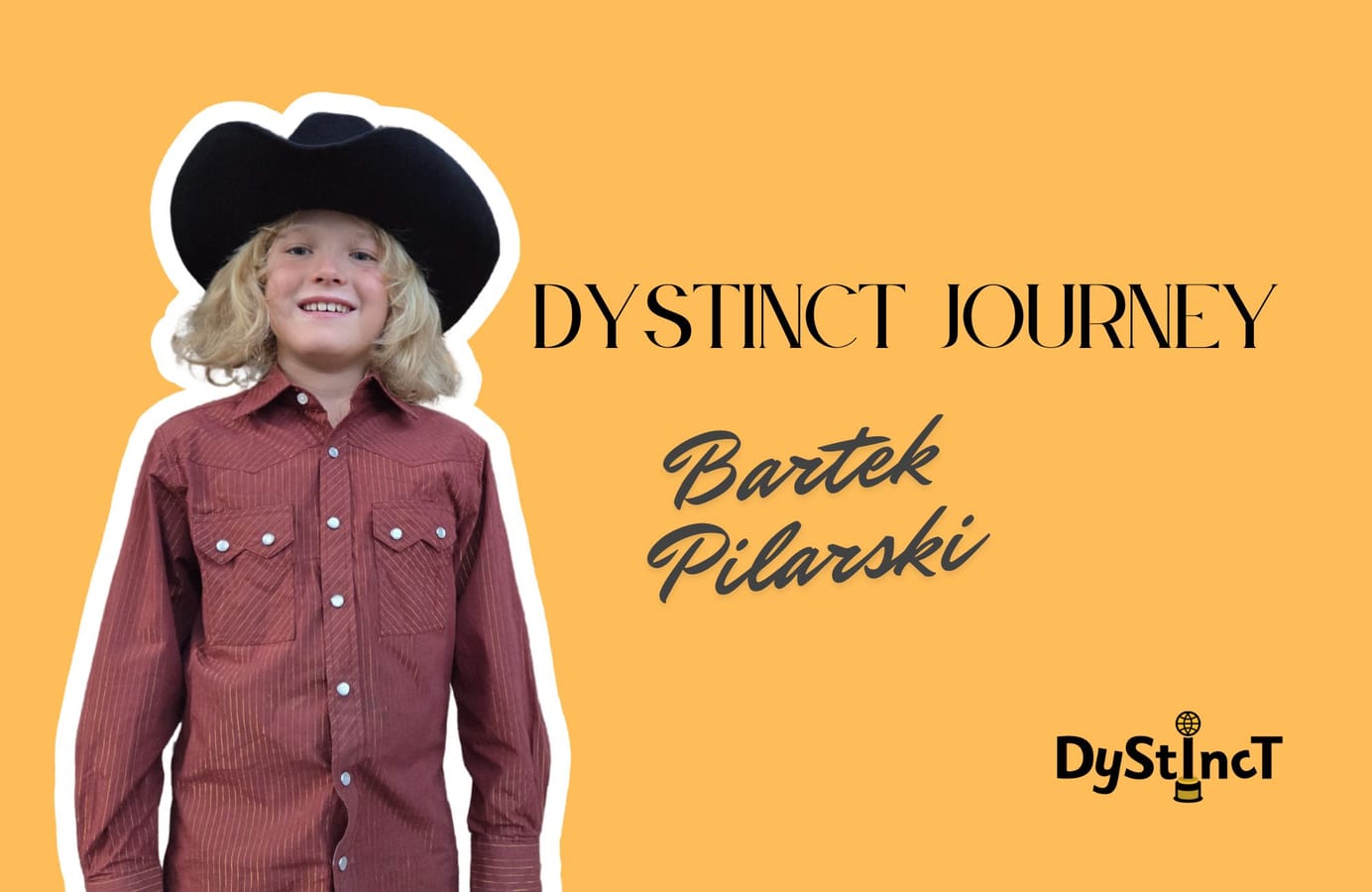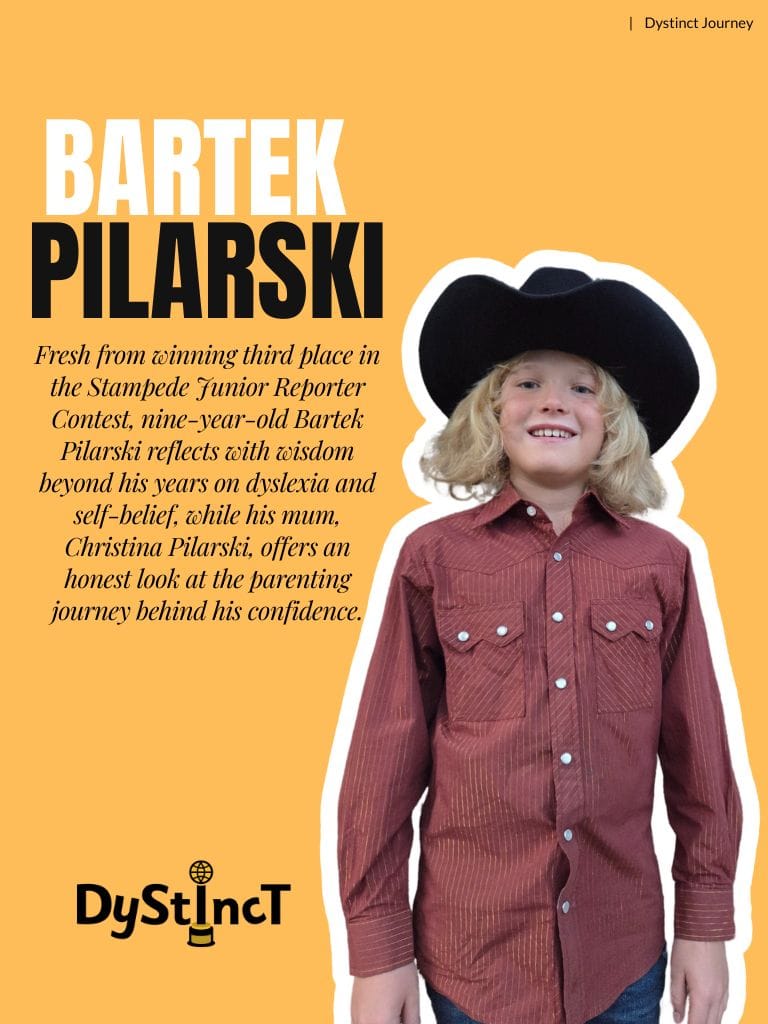
Issue 28: The Dystinct Journey of Bartek Pilarski
Fresh from winning third place in the Stampede Junior Reporter Contest, nine-year-old Bartek Pilarski reflects with wisdom beyond his years on dyslexia and self-belief, while his mum, Christina Pilarski, offers an honest look at the parenting journey behind his confidence.

Nine-year-old Bartek Pilarski from Calgary, Canada, recently won third place in the Stampede Junior Reporter Contest, impressing judges with his confidence and creativity. Instead of letting his dyslexia hold him back, Bartek found his own way to shine. He drew a visual script filled with pictures rather than words and spoke confidently about what he loved most, earning third place among more than a thousand participants. His approach was so original that the judges said, "Wow, this is the first time we've ever seen that in all our years of training and grading reporters."
We are fortunate to have young Bartek joining Dystinct as one of our Junior Reporters. To celebrate, we asked his mum, Christina Pilarski, to share their family's journey, the early signs, challenges, wins, and the lessons they have learned along the way.
"Bartek is empathetic, energetic, kind, and visionary," says Christina. "Nobody can make me laugh and reflect quite like he can. He loves to coach and teach, always eager to help others grow. Even when he was little, instead of going to soccer practice, he would tell the coach he was the assistant coach," Christina laughs. "He just loves sharing what he knows."
Christina recalls first noticing Bartek's challenges in the early school years. "In kindergarten, everything was fine," she says. "It was mostly memorising letters and sounds, and he managed well. But when first grade began and sight words and reading particular words came into play, we started to see some struggles and a few tears. It just wasn't coming as naturally for Bartek as it did for his brother."
Bartek is a twin, and his brother Jacob picked up schoolwork more easily. "As parents of two children the same age, you can't help but notice when one is finding something harder than the other," Christina shares. "We never compared them, but it was a moment to pause and think, this is interesting. Around that time, my husband, Peter, began reflecting too, remembering his own struggles with reading when he was that age."
It just wasn't coming as naturally for Bartek as it did for his brother.
Bartek has been fortunate to have never faced bullying or unsupportive teachers. "He just has a way of getting everyone on his team," Christina says. "He's very convincing and very charismatic, so it hasn't been an issue for us, which is huge. But we've always encouraged him to be brave, to speak up, and to be that guy who isn't afraid to use his voice."
Christina credits the strong support network at the River Valley School for helping the family take the right steps early on. "We're lucky his school has been extremely supportive," she says. "In grade one, when we all started to notice things, they were the ones who made the right introductions to help us get that assessment."
It wasn't only a teacher who raised the concern; the school's occupational therapist also noticed some delays and reversals with letters like b and d. "That was the moment we decided to have a real conversation about dyslexia," Christina remembers. "As a parent, it was scary at first. I felt overwhelmed and unsure. But the school quickly came to our side. I feel so grateful to be in a place where there are specialists who not only understand dyslexia but also help parents learn how to support their child."
Some of the best advice the family received came from the occupational therapists at Bartek's school. "They told us it was okay to take a break," Christina says. "Even if I kept reading to him or he was just following along, we were still putting in the work." That reminder helped ease the pressure at home.
For Christina, the process also became a personal learning journey. "I wanted to learn as much as I could, as quickly as I could, so that I could support him in the ways he needed," she says. "It was hard at times, watching him get frustrated and feeling like I had to push him forward. I had to learn how to push him in ways that helped rather than discouraged him. For me, it was about learning as much as possible so I could be the support he needed."
I had to learn how to push him in ways that helped rather than discouraged him.
At first, Jacob didn't realise that Bartek was behind or understand why his brother was getting extra attention. "He saw it as something special," Christina says. "He wasn't thinking, 'My brother can't do this,' but more like, 'My brother has something special in him that makes people want to listen to him.' I loved that. It helped us teach them both that everyone has their own kind of special."
One of Christina's favourite memories from before the boys were placed in separate classes was when the teacher shared a moment from an assessment. "Bartek didn't know the answer to a question and said, 'I'll just ask my brother,'" she laughs. "It was cute but also telling. He knew his brother knew things he didn't. They've always had this unique bond. We've made sure to foster that individuality by putting them in different classes and sports and spending time with them separately. It's been such a strength for both of them."
It helped us teach them both that everyone has their own kind of special.
First grade was a hard year for Bartek. Reading felt like an uphill climb, and even with all his effort, it just didn't come easily. Things began to feel a little easier in second grade when he had a teacher who really understood him. "His teacher, Rachel Branscombe, was incredible," Christina says. "She took the time to learn about dyslexia and worked alongside him with so much care."
Bartek also had a teaching assistant named Brenda, who found creative ways to keep him engaged. "Her chair broke one day, and because Bartek loves fixing things, she asked him to repair it," Christina recalls. "It might sound small, but it meant a lot. They made him feel like he mattered and that his strengths were just as important as the things he was working on."
Now in grade four, Bartek continues to have teachers who believe in him. "Mrs Green and Mrs Stauss are equally wonderful," Christina says. "They motivate him and help him lean into his strengths with the right tools, like speech-to-text and extra support. We're really lucky to have that kind of understanding at River Valley School."
Outside the classroom, Bartek's caring nature shines just as brightly. "He's a helper and has such a heart for making sure everyone is okay," Christina says. "Even on the football field, he's a defence player, so he knocks a lot of kids down, but he's always the first to offer a hand, check they're alright, and pat them on the shoulder. He wants everyone to feel like they're part of the same team."
Listen to your child. They'll tell you what they need.
That same spirit shows up at home, too. "He never gives up," Christina adds. "After a two-hour football practice or a long day at school, he still sits down to read. Even if it's just a sentence or two, he surprises me by pushing through. That's what I love about him."
When asked what advice she would give to other parents just beginning this journey, Christina doesn't hesitate. "Listen," she says. "You think you know the playbook and where your child should be, but they'll tell you what they need. There have been moments where Bartek just needed a break, and when I gave him that time, he always came back stronger. When he feels ready to read or write, I clear the table, try to get it happening right away, and celebrate that moment with him. Those are the times that matter most.
This post is for paying subscribers only
SubscribeAlready have an account? Log in


